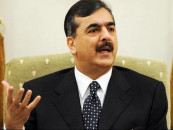Lose sovereignty, lose the state
Agamben et al have correctly argued that “we lack a genuine theory of the state of emergency within public law”.

Normal situations in a state manifest equilibrium between public law and political fact. Just like normalcy in individual life does not demand tough moral choices, neither does a collection, in this case a state, face tension between law and politics when the situation is not out of joint. But states and societies have faced crises throughout history and when a state faces an existential threat, it demands, as empirical evidence suggests, that law must bow to the political fact.
The Roman term ‘iustitium’ literally signified the suspension of the ‘ius’, the legal order. Ethics philosopher Giorgio Agamben states in his essay “The state of emergency”, that “the state of emergency would be situated at an ‘ambiguous and uncertain fringe at the intersection of the legal and the political,’ and would constitute a ‘point of disequilibrium between public law and political fact.’”
In other words, the situation and its demands are to be “understood through the terrain of politics rather than through the legal and constitutional terrain”.
Why must this be so? When a state loses its sovereignty, it ceases to exist, not in a physical sense — Somalia still exists, for example — but in terms of its basic and most essential identity. German jurist and philosopher Carl Schmitt, in his highly acclaimed and equally controversial work, “Political Theology”, described the sovereign as “he who decides on the exception”, by which he meant that, when required, especially in public interest and for the survival of the state, the sovereign would even step outside the bounds of law.
Philosopher Achille Mbembe, in an essay “Necro-politics”, begins by saying that “the ultimate expression of sovereignty resides, to a large degree, in the power and the capacity to dictate who may live and who must die.”
Regardless of the fine print in these statements, regardless also of whether “to exercise control over mortality and to define life as the deployment and manifestation of power” is acceptable, because in some cases it is not, one fact is obvious: Sovereignty plays the central role in determining the existence or otherwise of a state.
In which case, if a state, in fear of supra-state actors, either refuses to, or is incapable of, protecting the life and property of its citizens, it loses the most essential attribute of being a state. Pakistan is on the verge of becoming just such a state.
Take the issue of blasphemy. The government, for several reasons, stated clearly that it was not touching the blasphemy law. But that did not prevent vested religious interests from killing Salmaan Taseer, the Punjab governor. The moment that happened, the government, instead of exercising sovereignty, tucked tail and left all the decent people of this country at the mercy of extremist marauders.
No state can afford to abdicate thus. When a cleric threatens Sherry Rehman or another extends a public threat to Shehrbano Taseer, they encroach on that attribute of the state which it cannot share with anyone — “the power and capacity to dictate who may live and who must die”.
At a dinner, three days after Salmaan Taseer’s brutal murder, I said to Interior Minister Rehman Malik that the clerics who were extending threats should be held under relevant laws for incitement to murder. Malik’s response was pusillanimous. He said in a circuitous way that he feared a backlash. I tried to argue that the invocation of law in these cases had nothing to do with blasphemy. It must be exercised because someone had violated the law and the state could not allow that. My argument did not cut ice with the minister.
The reluctance to act, after Salmaan Taseer’s killing, has resulted in the inevitable: The gruesome murder of Shahbaz Bhatti, a federal minister. It is easy for those who wield the gun to isolate and take out the citizens of this country because the state has handed over the exercise of its sovereignty to individuals and groups. The slain minister knew he would be killed; he even knew that the government, of which he was a cabinet member, would do nothing to save him.
It should be clearly understood that when this happens, the legal-constitutional construct in which the state is grounded and on which basis it exercises its sovereignty is already dead. And with it, the other casualty is decency.
Is the state really so weak? Or is it this government, representing the state at this point, which is weak? I’d put my wager on the latter than the former. I do not believe that the state cannot formulate a comprehensive strategy and take on those who are threatening and killing Pakistanis. There is no gainsaying that sections of this society, large sections in fact, have become regressive in their approach. But that fact precisely is the challenge, the acid test of the state’s sovereignty. By capitulating, the state has failed it.
There is no point in talking about an independent judiciary and the exercise of public law if the state will not invoke the legal framework that underpins, to quote Schmitt again, the political, the concept that subsumes all else, including law.
Of course, there is danger in deciding on the exception. Agamben et al have correctly argued that “we lack a genuine theory of the state of emergency within public law”. There is need to develop such a theory but it is a tough calling because emergency uses law to denote the absence of law. But when survival is at stake and when decent citizens are being gunned down mercilessly, the political fact must trump public law — knowing, as I wrote in the article which begot Feisal’s response, that we must not lose sight of the fact that an emergency response is just that and not a norm.
Published in The Express Tribune, March 11th, 2011.



















COMMENTS
Comments are moderated and generally will be posted if they are on-topic and not abusive.
For more information, please see our Comments FAQ